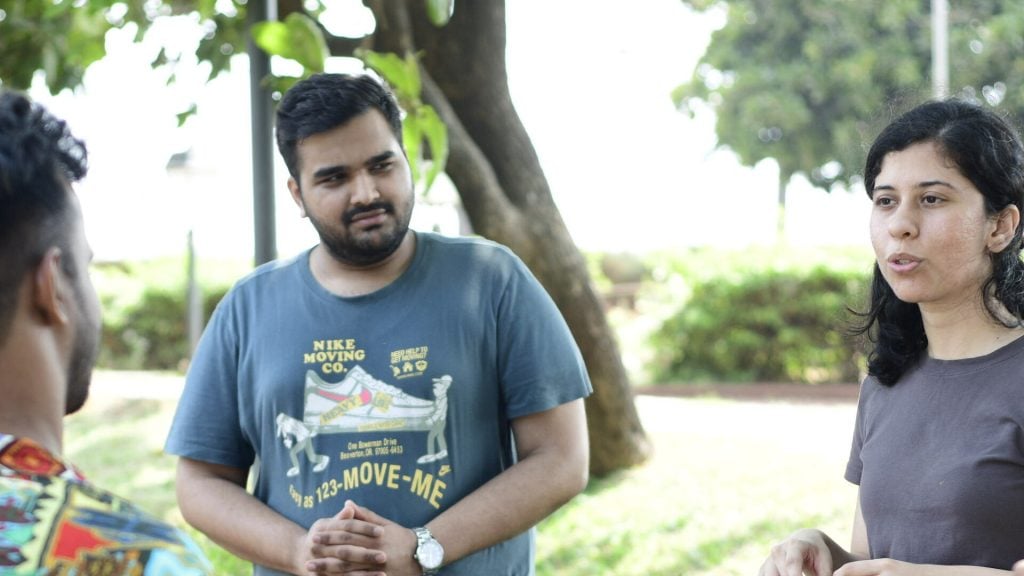
What is Bystander Intervention?
Bystander Intervention can be defined as ‘a social science model that predicts the likelihood of individuals (or groups) willing to actively address a situation they deem problematic’. A bystander can be present in a situation and observe it, but to intervene is to take the next step and respond to the said situation. There is still little research done on harassment and violence in regards to queer people in India, let alone bystander intervention in these cases. Queer people are more likely to be discriminated and harassed in different settings. One such example is in the workplace. In a US survey, 80% of the transgender population who were employed experienced harassment or mistreatment on the job or took steps to avoid it.
Bystander Intervention Strategies
Bystander intervention involves The Four D’s: direct (by intervening directly and breaking up or inserting yourself into the situation verbally or physically), distract (by redirecting the attention of those causing harm in a situation), delegate (by seeking out external help) and delay (checking in with the person later on to see how they’re doing). Delay is often an important step not mentioned in many bystander intervention strategies that solely focus on the first 3 steps. It is particularly important to remember your own personal safety when choosing whether to intervene or not. Being a queer person and choosing to intervene means having to consider whether or not our queerness will affect our safety in a situation.
Limitations of Bystander Intervention: Theory and Practices
Bystander intervention approaches need to ensure they look past the binary of the ‘cisgender male aggressor’ and the ‘cisgender female victim’. This ignores the many intersectional ways that harassment, discrimination and violence can manifest e.g. transgender women of colour experiencing serious violence. Women of colour, queer and trans individuals and people with disabilities are continually erased from conversations around abuse and violence, with their narratives nonexistence in media.
Tips around bystander intervention can be really limited and not at all applicable in relation to queer and trans violence. When living in an oppressive society, it can be difficult to implement the delegate aspect of bystander intervention and get help from other authorities or other people. For example, in a report by the HRC, it was highlighted that observers blamed lesbian, gay and bisexual victims more when attacks occurred just after public displays of affection for their partner, such as handholding, kissing hello or kissing goodbye (Lyons 2006, 50). When institutions such as the police or nightclubs hold homophobic or transphobic views, how can it be ensured that delegation won’t make a situation worse? Further, when there are no laws in place to help protect queer and trans individuals, what is there to do?
Bystander Intervention and Alternative Strategies
Intervening positively as a bystander is one way to be a good ally to queer people, but there are many other ways to be an ally. Staying informed about the intersectionalities within the queer community, as well as the legal and social changes happening with regards to queer rights in India (such as the recent Trans Rights Bill that has been passed), is important. Using the internet as a resource as opposed to relying on your queer friends as a source of knowledge will go a long way. Checking in on friends continually during times when their rights come into question is the most basic of what we can do for the community.
If a LGBTQ+ person is being bullied and your best intentions are to intervene, it’s important to know that the individual may not be out yet, so seeking support and help from others and exclaiming their sexuality could do a lot more harm than good. Being mindful about bystander intervention is important in this instance. In situations where it is necessary to delegate, make sure the person is trusted and maintains confidentiality. If it is appropriate, ask what action the queer person would prefer and listen to them, which is an imperative part of the delay process. All of these considerations will help in becoming a good ally and being able to intervene appropriately and safely for queer persons.
Harshil Shah is the Program Officer at the Queer Resource Center, One Future Collective.
Feature image source: The Concordian